|
|
|
Sort Order |
|
|
|
Items / Page
|
|
|
|
|
|
|
| Srl | Item |
| 1 |
ID:
137229
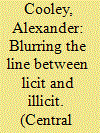

|
|
|
|
|
| Summary/Abstract |
The anti-corruption norm in both scholarship and the policy world has too narrowly focused on the domestic and institutional context of bribe-taking and public corruption. Instead, we argue that corruption in the contemporary global economy requires a multiple set of connected transactions, processes, and relationships that take place within informal transnational networks that blur the line between illegal and legal activities. These networks include multinational companies, elites in host countries, offshore financial vehicles and conduits, middlemen and brokers, and destination financial institutions. We examine how these actors operate in Central Asia, a region that is widely identified as corrupt, yet is rarely understood as embedded in the types of global processes, offshore connections and transnational links specified in our analysis. Examples of offshore centers in tax planning from Central Asia, and partial results from a field experiment based on impersonating high corruption risks from four Central Asian states, provide evidence for how the various actors in transnational financial networks structure their dealings. We then present two brief illustrative cases of how these transnational networks have operated in energy explorations services in Kazakhstan and telecommunications contracts in Uzbekistan. Our findings have theoretical, practical, and normative implications for scholars and practitioners of Central Asian international political economy and other ‘high risk' regions.
|
|
|
|
|
|
|
|
|
|
|
|
|
|
|
|
| 2 |
ID:
163348
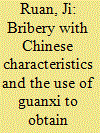

|
|
|
|
|
| Summary/Abstract |
Some scholars have attempted to find ways to distinguish guanxi from bribery, which can be difficult due to the role played by four traditional Chinese concepts and practices. First, people value the renqing ethic more than law, making it hard to judge whether a relation has “improper inducements.” Second, some interaction rituals used in bribery guanxi are a type of moral performance, undertaken to justify immoral practice – this mixes together guanxi practice with bribery. Third, some of the “ganqing” (affection) and esteem expressed in bribery guanxi results from this moral performance, rather than from genuine affection and esteem. Fourth, some people try to embody their relationship as an enduring guanxi, rather than one-off bribery, which exacerbates the difficulty in distinguishing guanxi from bribery. Because of the moralizing culture and the custom of mixing together renqinq and bribery, it can be difficult to distinguish bribery from guanxi by attempting to judge whether an action is purely based on esteem or coercion, on an enduring relationship or a one-off exchange, on improper inducement or proper conduct, or other such formal distinctions.
|
|
|
|
|
|
|
|
|
|
|
|
|
|
|
|
| 3 |
ID:
154434
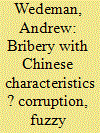

|
|
|
|
|
| Summary/Abstract |
This paper addresses the question of whether the way bribery is practiced in China is such that corruption might be compatible with rapid economic growth during the boom years between 2000 and 2007. In particular, it examines whether bribery based on diffuse reciprocity transforms a corrupt relationship from one based on short-term egoistic gains (looting) to one based on long-term gains (profit maximizing), with the assumption that such a form of bribery will lead the parties to maximize total gains and hence will encourage long-term growth rather than short-term predatory looting. More broadly, the paper inquires whether a regime of informal property rights based on bribery and diffuse reciprocity might compensate for the shortcomings of an imperfectly constructed and incomplete set of formal property rights such as has emerged in post-Mao China and thereby improve the prospects for economic growth. The paper concludes that while bribery based on diffuse reciprocity may encourage the parties directly involved in such corrupt exchanges to maximize their total long-term gains, so long as bribery remains a private good and an informal property rights regime based on bribery remains subject to abrupt and catastrophic revision due to its illegal nature, “bribery with Chinese characteristics” cannot be characterized as growth enhancing and thus cannot be a major explanation for why the Chinese economy grew rapidly during the “third boom.”
|
|
|
|
|
|
|
|
|
|
|
|
|
|
|
|
| 4 |
ID:
117716
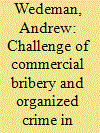

|
|
|
|
|
| Publication |
2013.
|
| Summary/Abstract |
Corruption has been classically defined as the misuse of public authority for private gain, which implies that corruption necessarily involves official authority and hence public officials. Bribery, however, often involves transactions between officials and private interests, including business interests, whereby the private party seeks to bend public authority to their advantage by paying off their official interlocker. Even in its classic form, therefore, corruption often spans both the public and the private. Public officials are not, however, alone in exercising authority. Managers and corporate officers also wield authority or fiduciary responsibility on behalf of others and can abuse that authority for private gain, not only in transactions involving public officials, but also in transactions with private parties. This article examines how China's anti-corruption institutions have dealt with 'commercial corruption', including both public-to-private corruption and private-to-private corruption. It also examines the linkages between organized crime and corruption in China.
|
|
|
|
|
|
|
|
|
|
|
|
|
|
|
|
| 5 |
ID:
093827
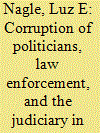

|
|
|
|
|
| Publication |
2010.
|
| Summary/Abstract |
Mexico is a failing state, languishing under a deeply entrenched system of political corruption that undermines the three branches of government and compromises Mexico's law enforcement and national security capabilities. This article explores the culture of corruption that pervades the state and frustrates the rule of law in Mexico, examining how the political elites, the judiciary, and police officials embrace corruption as a primary means for career advancement and for acquiring personal wealth. It is an examination of a country overwhelmed by a system of government and commerce that has grown dependent on corruption in order to function. But such a system cannot sustain itself indefinitely, and the signs of the Mexican state's collapse are becoming more apparent in the wake of unprecedented political and social violence at the hands of corrupt actors and Mexican drug lords.
|
|
|
|
|
|
|
|
|
|
|
|
|
|
|
|
| 6 |
ID:
105586
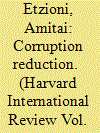

|
|
|
| 7 |
ID:
115209
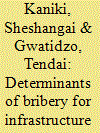

|
|
|
|
|
| Publication |
2012.
|
| Summary/Abstract |
Existing empirical evidence suggests that corruption in infrastructure is prevalent in developing countries. Using data on manufacturing firms in Kenya, Uganda and Tanzania, this study investigates what type of firms are asked to pay bribes by public officials in order to access infrastructure. We find that firms in Tanzania and Uganda face more severe problems with infrastructure than those in Kenya. Despite facing fewer infrastructure constraints, we find that Kenyan firms are more likely to be asked for bribes than Ugandan and Tanzanian firms; suggesting that paying bribes could be enabling Kenyan firms to access limited infrastructure. We also find that larger firms are less likely to be asked for bribes, and that an efficient court system reduces the propensity of public officials to ask for bribes. In addition, firms located in capital cities are more likely to be asked for bribe payments. These findings provide policy makers with specific targets to aim for in the design of policies meant to address corruption in infrastructure provision.
|
|
|
|
|
|
|
|
|
|
|
|
|
|
|
|
| 8 |
ID:
182427
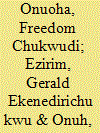

|
|
|
|
|
| Summary/Abstract |
The emergence of the novel coronavirus (COVID-19) in November 2019 has nearly brought the world to a halt. Recording her first COVID-19 case on 27 February 2020, the Nigerian government’s default response to the pandemic was to lock down major parts of the country, among other measures. Despite the nationwide lockdown, inter-state travel continued unabated as many travellers bribed their way through the different checkpoints mounted by security agencies. As a result of the prevalence of ‘normed corruption’, the lockdown only created opportunity for brazen extortion by law enforcement officials. Using the institutional corruption theory as our framework of analysis, and coupled with the use of both primary and secondary data generated during the lockdown, the paper noted that entrenched culture of extortionate policing in the ranks of security forces meant that arrest and prosecution of violators of the lockdown became a distant concern. The result is that COVID-19 suspects or carriers travelled from one state to another without being detected. It concludes that Nigeria should leverage lessons learned from policing COVID-19 in framing future responses in containment
|
|
|
|
|
|
|
|
|
|
|
|
|
|
|
|
| 9 |
ID:
102846
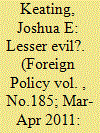

|
|
|
| 10 |
ID:
179327


|
|
|
|
|
| Summary/Abstract |
How can we make sure that states do not only sign international anti-corruption conventions, but also comply with them once the ink has dried? Peer review among states offers one answer to this question. This article develops a theoretical framework to study the different processes and mechanisms through which peer reviews can contribute to state compliance. It focuses on three processes: transparency, pressure, and learning. The article subsequently applies this framework to the OECD Working Group on Bribery (WGB) in order to identify how far participants in this peer review perceive the WGB as capable of organising these processes, and to what extent they consider these processes relevant for promoting state compliance. Data come from an online survey (74 observations) and 17 in-depth interviews. The findings reveal that this peer review exercise is perceived as effective in creating transparency about state behaviour, mobilising pressure, and stimulating learning. However, the extent to which these processes can promote compliance is more limited. For these processes to work, political will is crucial.
|
|
|
|
|
|
|
|
|
|
|
|
|
|
|
|
| 11 |
ID:
171065
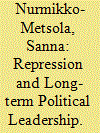

|
|
|
|
|
| Summary/Abstract |
This paper develops a model where an incumbent may try to bribe the security forces to repress the political opposition in order to improve his/her chances of winning the elections. Such situations can be demonstrated by the cases of Cambodia, Uganda and Zimbabwe where the political leadership has used repression in and around the election times. In a collusive equilibrium, the security forces produce violence and the leader responds by giving a bribe to the former, this pair of actions taking place in each period. A collusive equilibrium exists when the bribe that a leader is prepared to pay is at least as large as the bribe that the security forces are willing to accept. We find that a harsher expected punishment (e.g. a longer prison sentence) will improve an incumbent’s incentives to collude. In contrast, security forces expecting a harsher punishment will be less likely to repress. Furthermore, we discuss the circumstances under which windfall revenue (e.g. foreign aid, resource rents) may contribute to violence and when it may prevent it.
|
|
|
|
|
|
|
|
|
|
|
|
|
|
|
|
| 12 |
ID:
108347
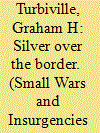

|
|
|
|
|
| Publication |
2011.
|
| Summary/Abstract |
US national security is seriously challenged by the more visible appearance of American law enforcement and security corruption among organizations charged with policing and protecting the US-Mexican border. A burgeoning number of allegations, criminal investigations, indictments, and convictions directed against US law enforcement personnel calls into question the fundamental integrity of US border security forces and leadership, as well as the willingness or capability of key agencies and their executive branch leadership to effect reforms. For the United States, such law enforcement and other official US Government corruption acts like corrosive acid on the legitimacy of these institutions and upon domestic and allied trust in their integrity and competence.
|
|
|
|
|
|
|
|
|
|
|
|
|
|
|
|
| 13 |
ID:
174029
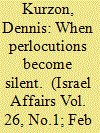

|
|
|
|
|
| Summary/Abstract |
In order to stay in the limelight and be re-elected, politicians depend on their voice to persuade potential voters or party members to support them in general elections or primaries, respectively; their assertions and claims in the form of illocutionary acts also function as perlocutionary acts of persuasion. But when politicians are under criminal investigation, often for corruption in Israel and in other countries, they may silence themselves during police investigation and court hearings, thereby silencing any perlocutionary act that may emerge from their answering questions. This article will examine the case of Naomi Blumenthal, who was found guilty of bribery and obstruction of justice in 2006, and who maintained silence during the police investigation.
|
|
|
|
|
|
|
|
|
|
|
|
|
|
|
|
|
|
|
|
|